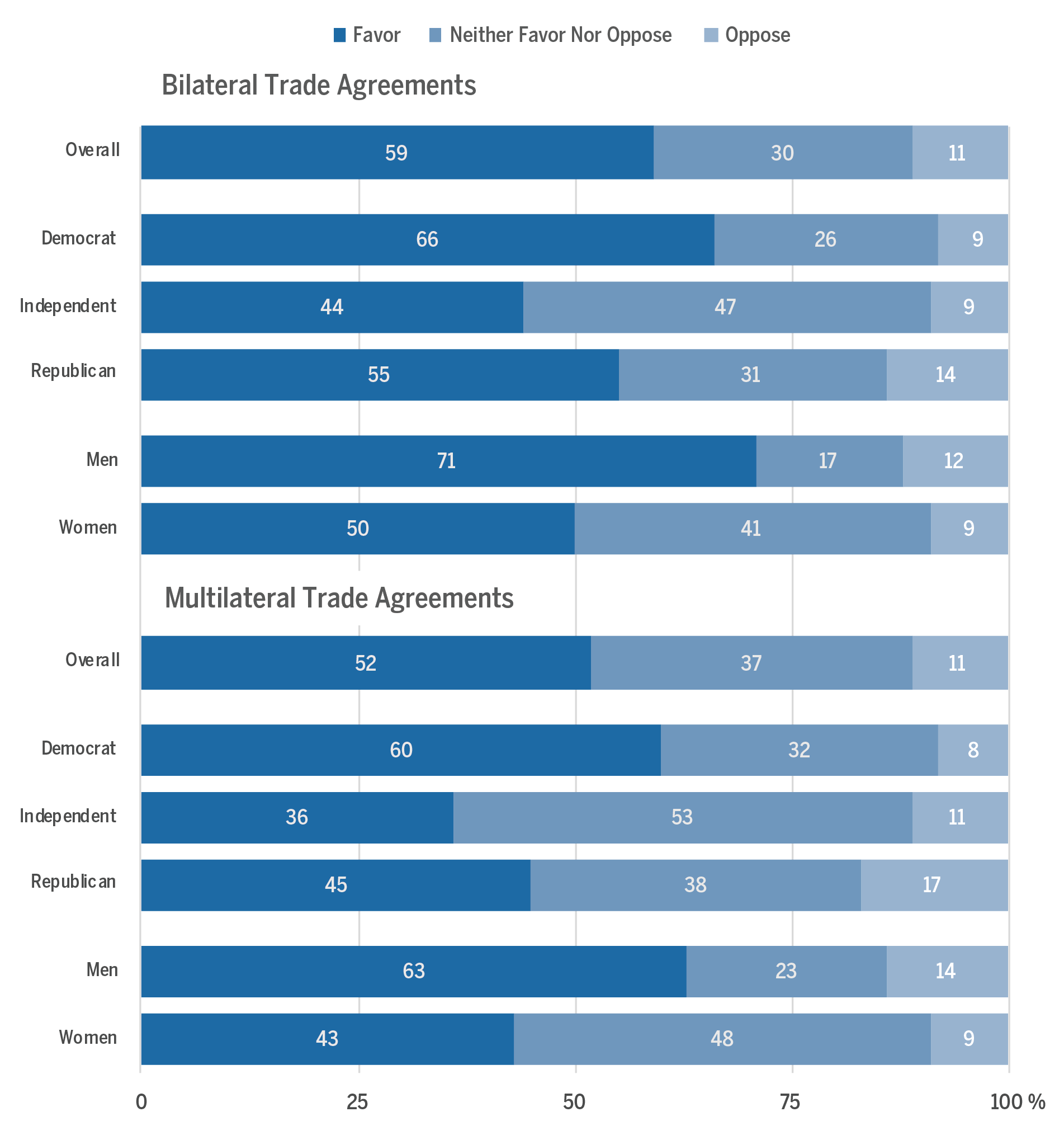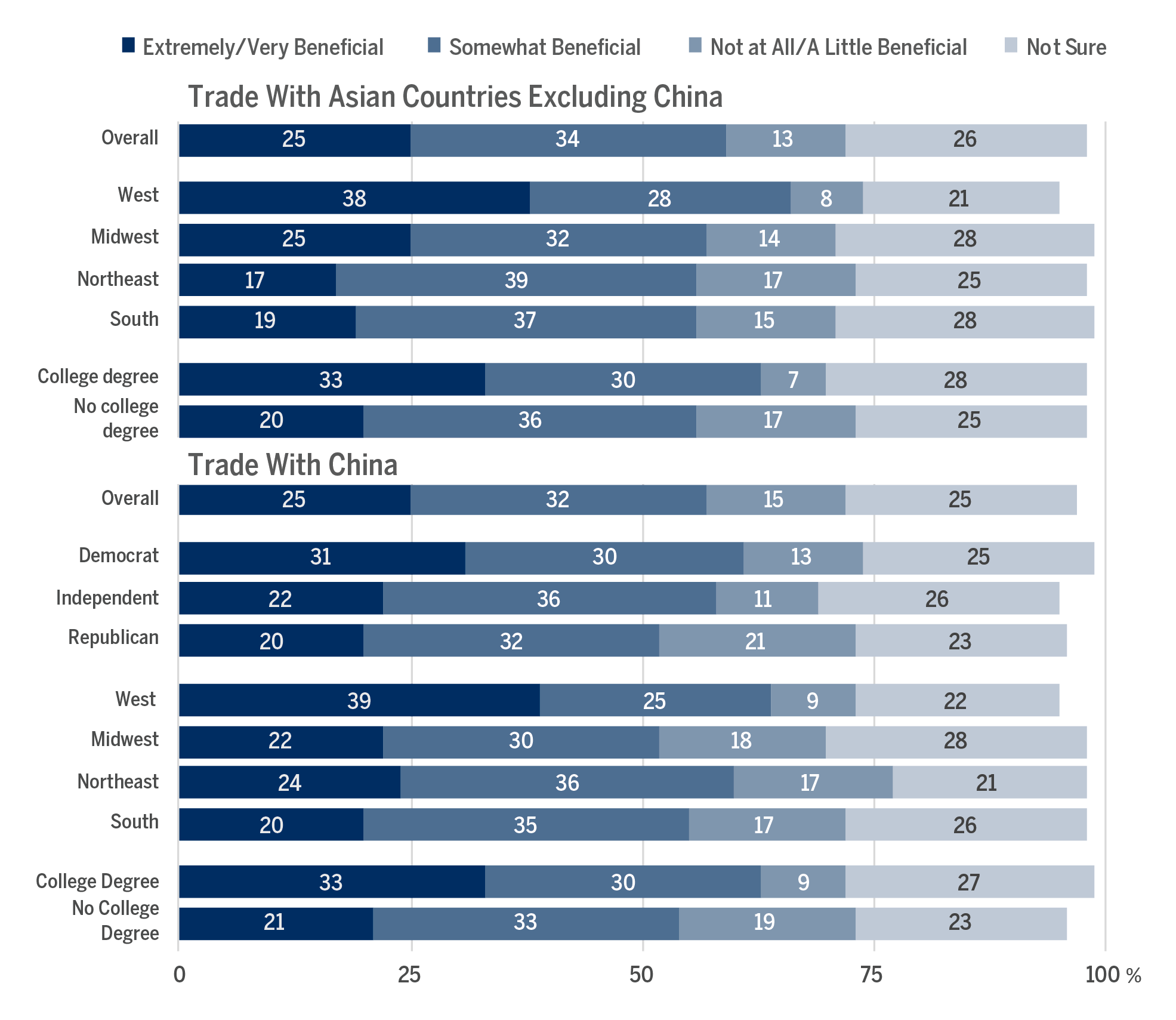The following article is part of an ongoing series of analyses based on the recent Asia Matters for America Public and Elite Opinion poll. See all articles in the series here.
A recent poll conducted by NORC at the University of Chicago for the East-West Center, has shown that many American elites[1] are supportive of entering new trade agreements with countries in the Indo-Pacific, though their perceptions vary greatly based on political affiliation, geographic location, gender, and the nature of the agreements. This matters because it demonstrates that while many Americans continue to support engagement with Asia, they differ in agreeing on how exactly to do so.
In the poll, American elites were defined as “state and local elected and appointed officials, bureaucrats, and business leaders”. When asked whether they favor or oppose joining new bilateral trade deals and agreements, 59% declared they supported doing so, while only 11% were opposed. Majorities of Republicans and Democrats both declared their support for bilateral agreements, though a plurality of independents (47%) declared they neither favored nor opposed joining them. Majorities from every region of the United States supported bilateral agreements, with support highest in the West[2] (67%) and lowest in the Midwest (54%). Perhaps most interestingly, the strongest divide between support and opposition to these agreements came from respondents’ gender identity; while 71% of men answered that they support bilateral trade agreements, only 50% of women said the same.
While a clear majority of respondents supported bilateral trade agreements, a much smaller majority supported multilateral trade agreements. 52% of respondents stated they supported these agreements, though only 11% actively opposed them (the same percentage as were opposed to bilateral agreements). This implies that, as a whole, respondents are more ambivalent about multilateral agreements and may not be as aware of them. In terms of political affiliation, 60% of Democrats supported these agreements, while only 45% of Republicans (a plurality) said the same. This time, 53% of independents declared their neither supported nor opposed multilateral trade agreements. Slight majorities of respondents in every region of the United States supported these agreements except in the Midwest, where a plurality of 46% percent was ambivalent about them. 63% of men supported multilateral trade agreements, while only 43% of women seemed to support them.
DO YOU FAVOR OR OPPOSE NEW TRADE DEALS AND AGREEMENTS?
Percent of adults

While the questions on free trade agreements were only asked to American elites, a majority of the general population surveyed agrees that free trade with Asian countries is somewhat or very beneficial; 57% said trade with China was somewhat or very beneficial, while 59% said the same for Asian countries excluding China. This is in line with previous studies which have found that Americans tend to support free trade in general, though they begin to differ on the specifics of how we conduct trade and how it benefits Americans. For example, a 2018 Pew Research Center poll found that while 74% of Americans support free trade in general, only 36% believe it creates jobs and 31% believe it increases Americans’ wages. Furthermore, college graduates and higher income individuals are more likely to support free trade, at 81% and 80%, respectively.
HOW BENEFICIAL HAS TRADE BEEN WITH THE FOLLOWING FOR YOUR STATE?
Percent of adults

A final point of note is that support for free trade agreements among elites seems to be inversely correlated with how much a region’s counties export to other countries based on Gross Domestic Product (GDP). While support for bilateral or multilateral free trade agreements tended to be relatively similar across regions, for both types of agreements support was somewhat weaker in the Midwest and the South. This is notable because, of the 50 US counties where exports accounted for the greatest percentage of GDP in 2017, the vast majority are located in these two regions. This brings up important questions about why Southern and Midwestern elites are less likely to support free trade agreements than their Western and Northeastern counterparts. Additionally, it also leads to the question of how the general population in these regions perceive free trade agreements compared to elites.
Though only elites were asked about free trade agreements, results of this poll demonstrate that while free trade is broadly supported across the United States, populations differ in perceiving how we should engage in free trade. It seems that free trade agreements in particular are viewed in quite divergent ways depending on one’s gender, political affiliation, geographic location, and the nature of the agreement. Many Americans continue to be ambivalent about them, meaning the nature of free trade with Asia is still likely not well understood by many Americans. For proponents of deeper economic integration with the Indo-Pacific, these factors must all be taken into account while advocating for further US-Asia trade. Nonetheless, the general support demonstrated for trade implies that there is still great support for engaging in fair, equal trade with other countries. As such, policymakers should further examine these differing perspectives on trade agreements to better understand groups’ concerns and how trade might be able to benefit them the most.
Michael Di Girolamo is a former participant in the Young Professionals Program at the East-West Center in Washington. He is currently a graduate student at the Johns Hopkins University School of Advanced International Studies.
Asia Matters for America Poll Analysis is a series of short articles exploring the results of the recent survey by the East-West Center and conducted by the NORC at the University of Chicago on American perspectives on US-Asia relations. Authors examine a segment of the results from the report regarding trade, tourism, international students, immigration, human rights, national security, and sister city relationships to attempt to understand how Americans believe Asia matters to their state.
[1] Elites: For the purposes of this survey "Elites" is defined as elected and appointed officials, bureaucrats, and business leaders. 1,446 people representing these three sub-categories answered the survey.
[2] Please refer to the map on page 4 of the report.